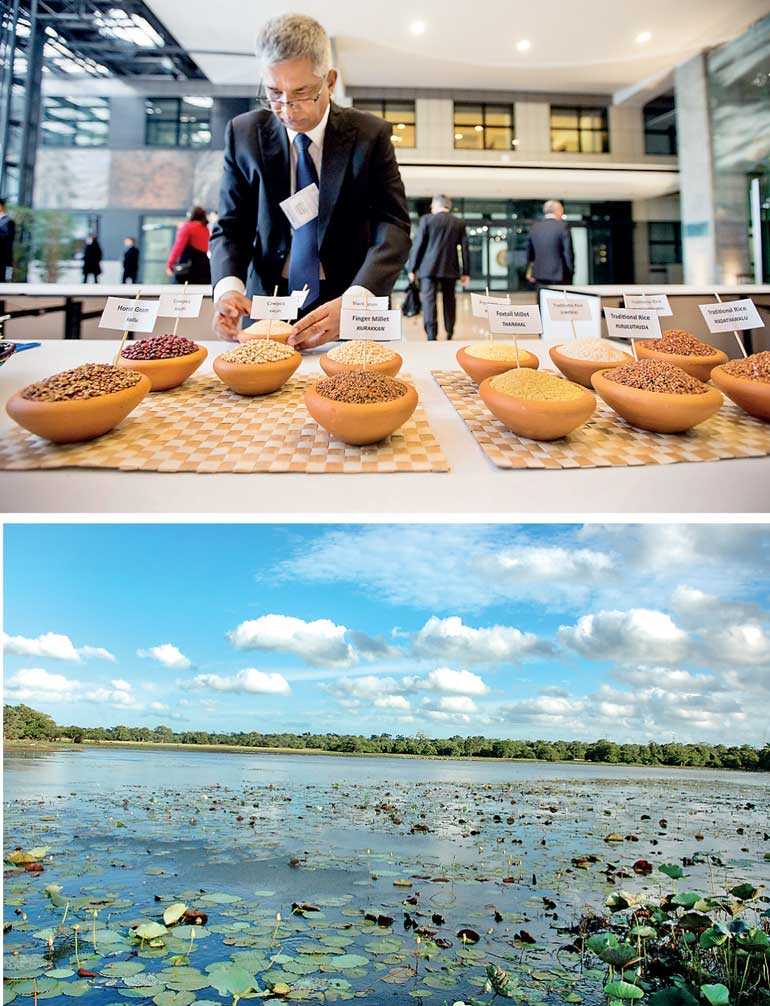Monday Feb 23, 2026
Monday Feb 23, 2026
Friday, 20 April 2018 00:00 - - {{hitsCtrl.values.hits}}

 Rome, Italy: A Sri Lankan agrarian system, the ‘ellanga gammana’ or cascaded tank-village system in the dry zone was designated as a Globally Important Agricultural Heritage System (GIAHS) by the Food and Agriculture Organization of the United Nations (FAO).
Rome, Italy: A Sri Lankan agrarian system, the ‘ellanga gammana’ or cascaded tank-village system in the dry zone was designated as a Globally Important Agricultural Heritage System (GIAHS) by the Food and Agriculture Organization of the United Nations (FAO).
The cascaded tank-village system in Sri Lanka was recognised at the International Forum and Award ceremony for new GIAHS sites in Rome, Italy.
FAO’s Deputy Director-General Maria Helena Semedo, granted the GIAHS award to Sri Lanka on 19 April at the FAO headquarters in Rome. Ministry of Agriculture Secretary B. Wijayaratne received this prestigious distinction on behalf of the country, and especially in the name of the farmers from the dry zone of Sri Lanka who over millennia have created, developed and maintained the cascaded ponds and tanks in the country.
Thirteen new agricultural heritage sites from China, Egypt, Japan, Republic of Korea, Mexico, Portugal, Spain and Sri Lanka were designated this year. With the new sites, there is a total of 50 globally recognized agricultural heritage systems in 20 countries. This FAO-led initiative aims to protect and promote valuable agricultural heritage, preserve biodiversity and traditional knowledge, as well as create resilient ecosystems.
The proposal to include the cascaded tank-village system in Palugaswewa in the Anuradhapura District to the FAO list of GIAHS was submitted by the Ministry of Agriculture last year. The Palugaswewa Divisional Secretariat area consists of 12 cascade systems, and is located within the Malwathuoya and Yanoya river basins.
The cascaded tank-village system is a connected series of tanks organised within a micro-catchment of the dry zone landscape, storing, conveying and utilising water from an ephemeral rivulet. It is an ancient, widely used and unique traditional agriculture system. The system provides water for irrigation, domestic purposes, animals and ecosystems.
The foundation for the largest part of the country’s agricultural production, the village tanks host a remarkable heritage of agro-biodiversity and wild biodiversity and constitute a unique buffer against natural disasters and climate change.
The global significance of this system is high due to the practical solution it provides to absorb shocks of natural disasters such as floods which can be controlled by storing water, and drought by reducing the water loss from tanks due to existence of the surrounding ecosystem. The cascaded tank-village system also contributes to efficient water management with water from one tank flowing to another, through a network of tanks and streams. However, the continuation of the cascaded tank-village system is threatened by the poor income of farmers, rural-urban migration of the youth, deforestation, and the degradation of the tank eco-system. Its protection is integral to ensure the continuity and improvement of the country’s food and livelihood security, as well as sustainable rural development.
The Government has taken a policy decision to reinforce the cascaded tank-village system and is preparing a Master Plan for the conservation and development of the system. The restoration of the ecological features of the ‘ellanga gammana’ has also been an important component in rehabilitating approximately 200 irrigation tanks in Sri Lanka through various FAO projects implemented in the post-conflict period.
In 2016, with the active participation of the village communities, the Ministry of Environment and the Ministry of Agriculture over 3000 forest plants were replanted in the upstream section (gasgommana) and the downstream reservation (kattakaduwa) of the Palugaswewa cascade system.
Globally Important Agricultural Heritage Systems such as the cascaded tank-village system in the dry zone of Sri Lanka have long played, and continue to play a crucial role at global, regional and national level for food security and sustainable development in the context of climate change.